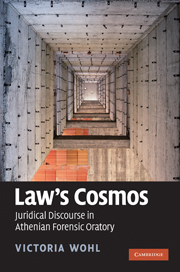Book contents
- Frontmatter
- Contents
- Preface: before the law
- Introduction: the rhetoric of law
- PART I THE BOUNDARIES OF LEGAL DISCOURSE
- PART II THE LEGAL SUBJECT
- PART III TIME, MEMORY, REPRODUCTION: LAW'S PAST AND FUTURE
- 5 Civic amnesia and legal memory: to remember and forget in the lawcourts
- 6 Family/law: legal genealogies
- Conclusion: the paradigmatic law
- Bibliography
- Index locorum
- General index
5 - Civic amnesia and legal memory: to remember and forget in the lawcourts
from PART III - TIME, MEMORY, REPRODUCTION: LAW'S PAST AND FUTURE
Published online by Cambridge University Press: 07 September 2010
- Frontmatter
- Contents
- Preface: before the law
- Introduction: the rhetoric of law
- PART I THE BOUNDARIES OF LEGAL DISCOURSE
- PART II THE LEGAL SUBJECT
- PART III TIME, MEMORY, REPRODUCTION: LAW'S PAST AND FUTURE
- 5 Civic amnesia and legal memory: to remember and forget in the lawcourts
- 6 Family/law: legal genealogies
- Conclusion: the paradigmatic law
- Bibliography
- Index locorum
- General index
Summary
There is a temporality particular to each type of rhetoric: to deliberative oratory the future, since it gives advice, pro or con, concerning what will happen; to forensic oratory the past, since both prosecution and defense always speak about events that have happened; and to epideictic oratory the present, since all speakers issue praise or blame according to existing conditions, though they often also recall the past and anticipate the future.
Aristotle Rhetoric 1358b13–20What if banning memory had no other consequences than to accentuate a hyperbolized, though fixed, memory?
Loraux 2002: 261ATHENS' AMNESTY AND LAW'S ALĒTHEIA
Forensic oratory, as Aristotle notes, is oriented toward the past. The law can try only events that have already happened. The speaker of Isocrates 20 bemoans this limitation. It would be best, he says, if criminals bore some mark (sēmeion) that enabled us to punish them before they committed their crime, “inasmuch as it is better to find a means of averting future problems than to punish those that have already occurred” (12). As it is, one should consider it a windfall when a criminal does come before the court, and punish him before he does something worse (12–14). Inherently retrospective, dikē is associated in Greek thought with memory. Zeus “does not overlook (or “forget,” lēthei) that sort of justice that a city holds in it,” says Hesiod (Erga 268–69). The avenging spirit of the murder victim, a demonic agent of justice, is called the alastōr, literally the “unforgetting one.”
- Type
- Chapter
- Information
- Law's CosmosJuridical Discourse in Athenian Forensic Oratory, pp. 201 - 242Publisher: Cambridge University PressPrint publication year: 2010

